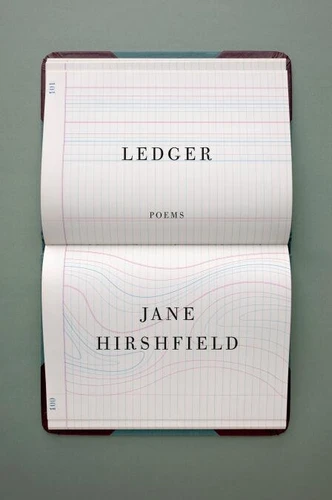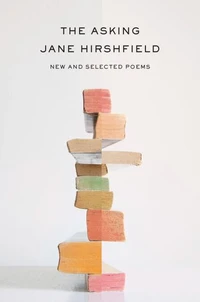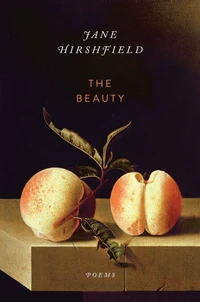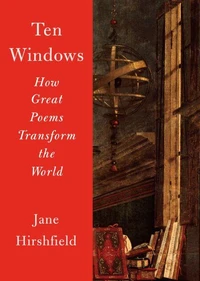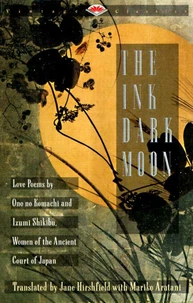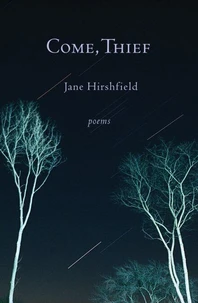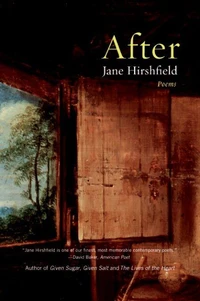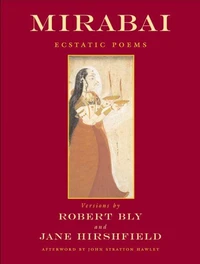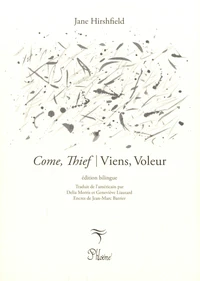Jane Hirshfield, chancelière de l'Académie des Poètes Américains, a reçu nombre de prix. Czeslaw Milosz disait d'elle : Jane figure parmi les étoiles les plus brillantes de ma fratrie de poètes californiens. Le premier poème de Jane Hirshfield paraît en 1973, peu de temps après qu'elle ne quitte Princeton, son diplôme de Lettres en main. Elle a fait partie de la première classe de cette prestigieuse Université à accueillir des femmes. Cependant, peu de temps après, elle met de côté son écriture et part au Zen Centre de San Francisco pour huit ans. Elle pensait qu'elle ne pourrait pas être un bon poète, sans approfondir au préalable sa connaissance de la nature humaine. Repensant à ces années de pratique elle dira plus tard qu'elles ne l'auront pas "immunisée" contre la souffrance du monde dont nous sommes tous témoins. Elle nous dit que "la vie continue à être terriblement dure et douloureuse" et sa très grande humanité l'enjoint d'en témoigner. Pour Jane Hirshfield, toute poésie se construit à partir d'une vie bien vécue et il fallait d'abord qu'elle découvre ce que signifiait vivre. Ses nombreuses publications (*) depuis 1988 sont toujours empreintes de cette affirmation. Ses poèmes paraissent régulièrement dans (entre autres) le New Yorker, Atlantic Monthly, Poetry, la American Poetry Review, Slate, Orion, McSweeneys aux USA et dans le Times Literary Supplement au Royaume-Uni et le Paris Review en France, ainsi que dans de nombreuses anthologies et livres universitaires. Elle a enseigné dans plusieurs universités : l'Université de California à Berkeley, l'Université de San Francisco, et participé aux séminaires d'écriture à Bennington Master of Fine Arts. . . Elle a été poète en résidence à Duke University, à l'Université d'Alaska, à l'Université de Virginie. . . Nommée Chancelière de l'Académie des Poètes Américains, Jane a aussi reçu le Prix Donald Hall- Jane Kenyon de Poésie Américaine, ainsi que de nombreuses bourses universitaires et diverses autres distinctions et prix littéraires (**). Elle a écrit trois livres d'essais sur la poésie et traduit (avec Mariko Aratani) un recueil de poèmes courtois japonais, The Ink Dark Moon. Elle continue son travail de rédactrice et d'éditrice (commencé en 1983) et son e-book The Art of Haïku rencontre un très vif succès depuis sa publication en 2011. Elle nous a offert deux livres en mars 2015, un recueil de poèmes, The Beauty et un recueil d'essais, Ten Windows : How Great Poems Transform the World.
Ledger. Poems
Par :Formats :
Disponible dans votre compte client Decitre ou Furet du Nord dès validation de votre commande. Le format ePub protégé est :
- Compatible avec une lecture sur My Vivlio (smartphone, tablette, ordinateur)
- Compatible avec une lecture sur liseuses Vivlio
- Pour les liseuses autres que Vivlio, vous devez utiliser le logiciel Adobe Digital Edition. Non compatible avec la lecture sur les liseuses Kindle, Remarkable et Sony
- Non compatible avec un achat hors France métropolitaine
 , qui est-ce ?
, qui est-ce ?Notre partenaire de plateforme de lecture numérique où vous retrouverez l'ensemble de vos ebooks gratuitement
Pour en savoir plus sur nos ebooks, consultez notre aide en ligne ici
- Nombre de pages128
- FormatePub
- ISBN978-0-525-65781-1
- EAN9780525657811
- Date de parution10/03/2020
- Protection num.Adobe DRM
- Taille1 Mo
- Infos supplémentairesepub
- ÉditeurKnopf
Résumé
A pivotal book of personal, ecological, and political reckoning tuned toward issues of consequence to all who share this world's current and future fate, from the internationally renowned poet. Ledger's pages hold the most important and masterly work yet by Jane Hirshfield, one of our most celebrated contemporary poets. From the already much-quoted opening lines of despair and defiance ("Let them not say: we did not see it.
/ We saw"), Hirshfield's poems inscribe a registry, both personal and communal, of our present-day predicaments. They call us to deepened dimensions of thought, feeling, and action. They summon our responsibility to sustain one another and the earth while pondering, acutely and tenderly, the crises of refugees, justice, and climate. They consider "the minimum mass for a whale, for a language, an ice cap, " recognize the intimacies of connection, and meditate upon doubt and contentment, a library book with previously dog-eared corners, the hunger for surprise, and the debt we owe this world's continuing beauty.
Hirshfield's signature alloy of fact and imagination, clarity and mystery, inquiry, observation, and embodied emotion has created a book of indispensable poems by a "modern master" (The Washington Post).
/ We saw"), Hirshfield's poems inscribe a registry, both personal and communal, of our present-day predicaments. They call us to deepened dimensions of thought, feeling, and action. They summon our responsibility to sustain one another and the earth while pondering, acutely and tenderly, the crises of refugees, justice, and climate. They consider "the minimum mass for a whale, for a language, an ice cap, " recognize the intimacies of connection, and meditate upon doubt and contentment, a library book with previously dog-eared corners, the hunger for surprise, and the debt we owe this world's continuing beauty.
Hirshfield's signature alloy of fact and imagination, clarity and mystery, inquiry, observation, and embodied emotion has created a book of indispensable poems by a "modern master" (The Washington Post).
A pivotal book of personal, ecological, and political reckoning tuned toward issues of consequence to all who share this world's current and future fate, from the internationally renowned poet. Ledger's pages hold the most important and masterly work yet by Jane Hirshfield, one of our most celebrated contemporary poets. From the already much-quoted opening lines of despair and defiance ("Let them not say: we did not see it.
/ We saw"), Hirshfield's poems inscribe a registry, both personal and communal, of our present-day predicaments. They call us to deepened dimensions of thought, feeling, and action. They summon our responsibility to sustain one another and the earth while pondering, acutely and tenderly, the crises of refugees, justice, and climate. They consider "the minimum mass for a whale, for a language, an ice cap, " recognize the intimacies of connection, and meditate upon doubt and contentment, a library book with previously dog-eared corners, the hunger for surprise, and the debt we owe this world's continuing beauty.
Hirshfield's signature alloy of fact and imagination, clarity and mystery, inquiry, observation, and embodied emotion has created a book of indispensable poems by a "modern master" (The Washington Post).
/ We saw"), Hirshfield's poems inscribe a registry, both personal and communal, of our present-day predicaments. They call us to deepened dimensions of thought, feeling, and action. They summon our responsibility to sustain one another and the earth while pondering, acutely and tenderly, the crises of refugees, justice, and climate. They consider "the minimum mass for a whale, for a language, an ice cap, " recognize the intimacies of connection, and meditate upon doubt and contentment, a library book with previously dog-eared corners, the hunger for surprise, and the debt we owe this world's continuing beauty.
Hirshfield's signature alloy of fact and imagination, clarity and mystery, inquiry, observation, and embodied emotion has created a book of indispensable poems by a "modern master" (The Washington Post).

